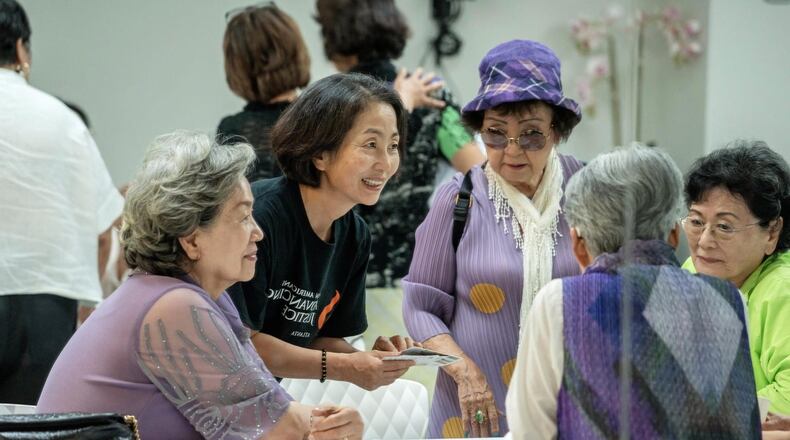On a late June afternoon, Kay Kang was speaking at the monthly meeting of the Korean Mothers Association of Atlanta in Suwanee. About 30 Korean American women in their 50s and 60s were sitting in chairs around long tables, quietly listening to her.
To the side, a table was neatly laid out with Korean dishes like japchae (stir-fried noodles). Three canvassers from Asian Americans Advancing Justice – Atlanta (AAAJ-ATL), a nonpartisan nonprofit organization, sat next to the food, with voter information pamphlets, ready to register people on the spot.
Kang is an outreach coordinator with the Norcross-based nonprofit. At the meeting, she was in her element.
“I tend to connect with [people like them] easily, given our shared immigration history and experience in this country. They are the easiest to approach,” Kang said.
Credit: Dean Hesse
Credit: Dean Hesse
Unlike door-to-door canvassing, her preferred strategy for reaching unregistered Korean American voters, particularly the elderly, is to build relationships and give presentations in these sorts of group settings.
As a nonprofit, AAAJ doesn’t advocate for any political candidates, but part of its mission is to help support Asian American participation in the electoral process. As Atlanta’s Korean population has grown, so has its representation at the polls. According to the 2020 U.S. Census, more than 72,000 Korean Americans were estimated to be residing in Georgia, with most clustered in Gwinnett, Fulton and DeKalb counties. Over the past decade, the Korean population in the state rose by 20%.
During the presentation, Kang spoke to her audience about the importance of voting and how it could help those with mostly immigrant backgrounds feel more connected to American society. Afterward, three of the attendees registered on the spot.
“I tell them voting can be hard, but this is something you must do as a U.S. citizen. But you also can’t get too pushy; you have to give respect for their space,” she said.
Kang’s job isn’t always easy, and she says it isn’t unusual for her to meet resistance and sometimes outright hostility. But her motivation to get Atlanta’s Korean diaspora to participate in the democratic process comes from her own history. She grew up in South Korea during its tumultuous postwar period, witnessing the country’s struggle to democratize. She watched her father fight an authoritarian regime.
When she talks to her audiences, she says she tries to convey the “preciousness” of voting to the Korean community. She’s even sat with them outside of polling places, helping fill out sample ballots.
“Older citizens really need step-by-step support when voting in this country,” Kang said. “They are not as accustomed to technology, and along with any language differences, many barriers exist for older Korean immigrants to fully participate in voting.”
HOW TO HELP
For more information on Asian Americans Advancing Justice-Atlanta, go to advancingjustice-atlanta.org.
To donate to AAAJ-Atlanta, go to advancingjustice-atlanta.org/donate.
About the Author
More In This Series
Everyday Heroes: Fayette County man remains devoted to clearing area of litter
Everyday Heroes: Evans man’s extreme bike rides raise money for cancer research
Everyday Heroes: Lawrenceville teen brings joy to pediatric patients
Everyday Heroes: Atlanta woman creates nonprofit to give back and break boundaries


